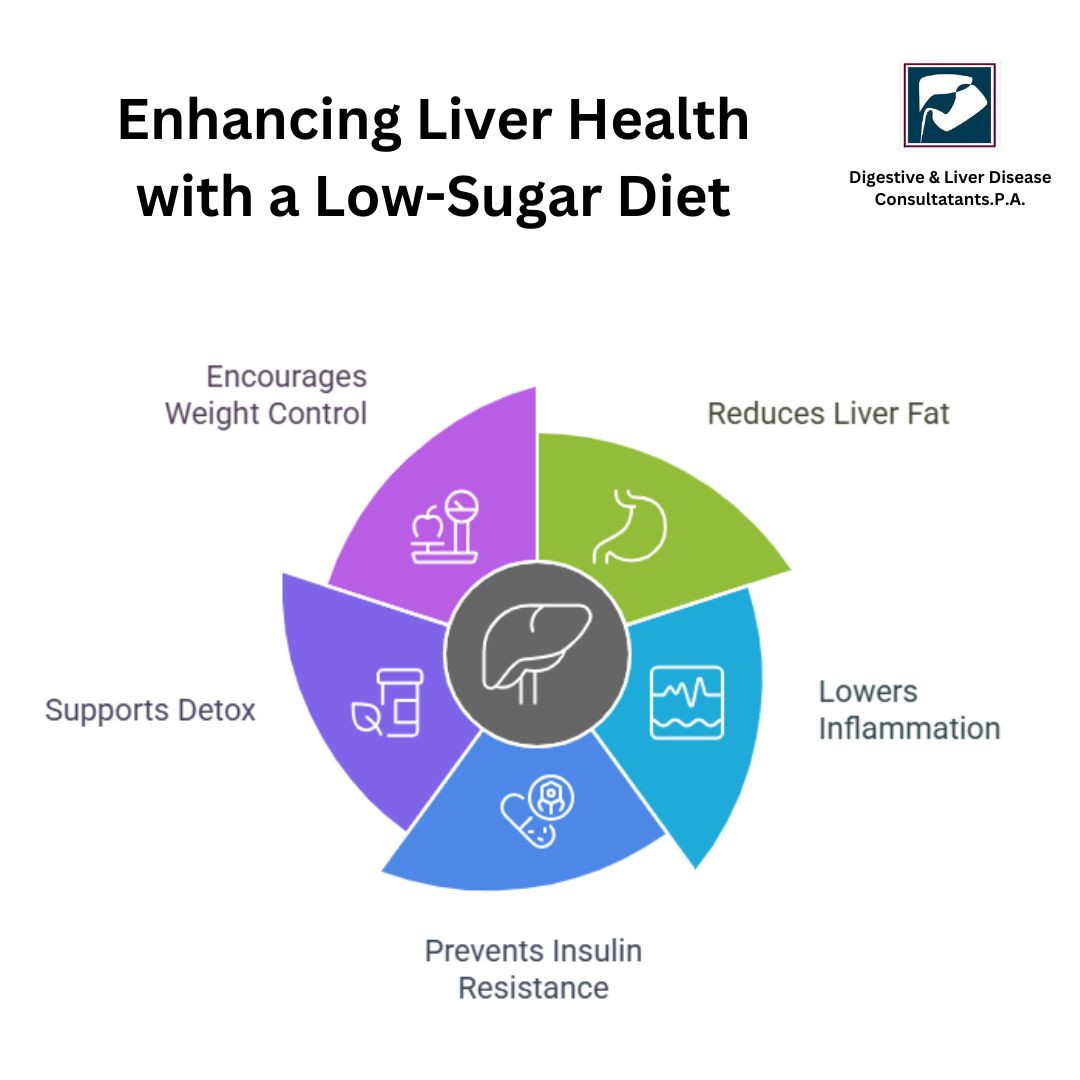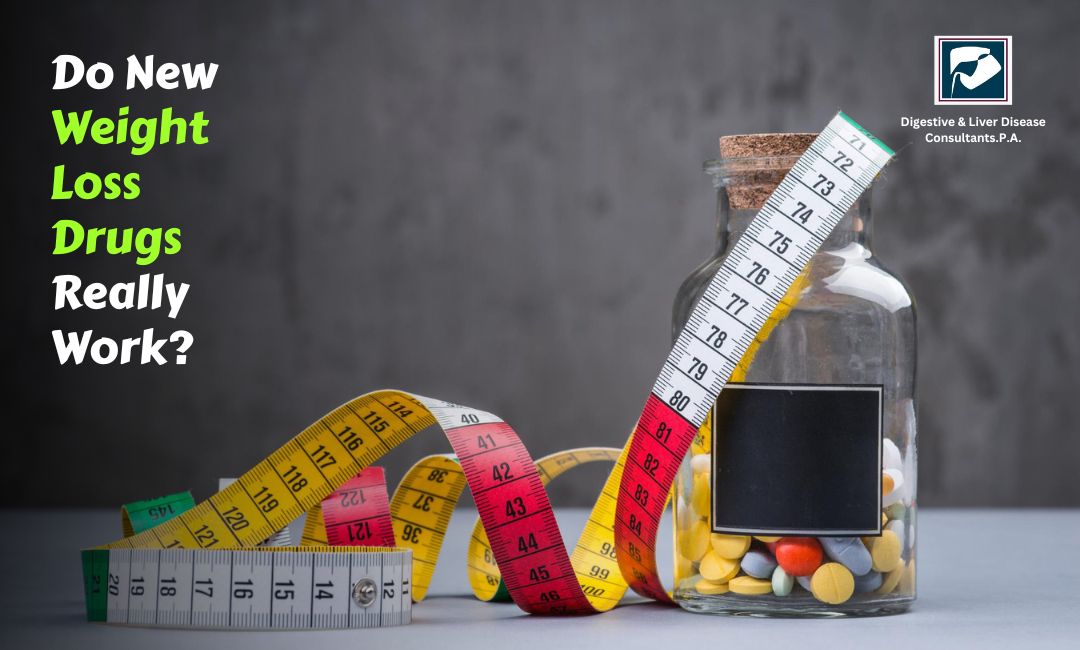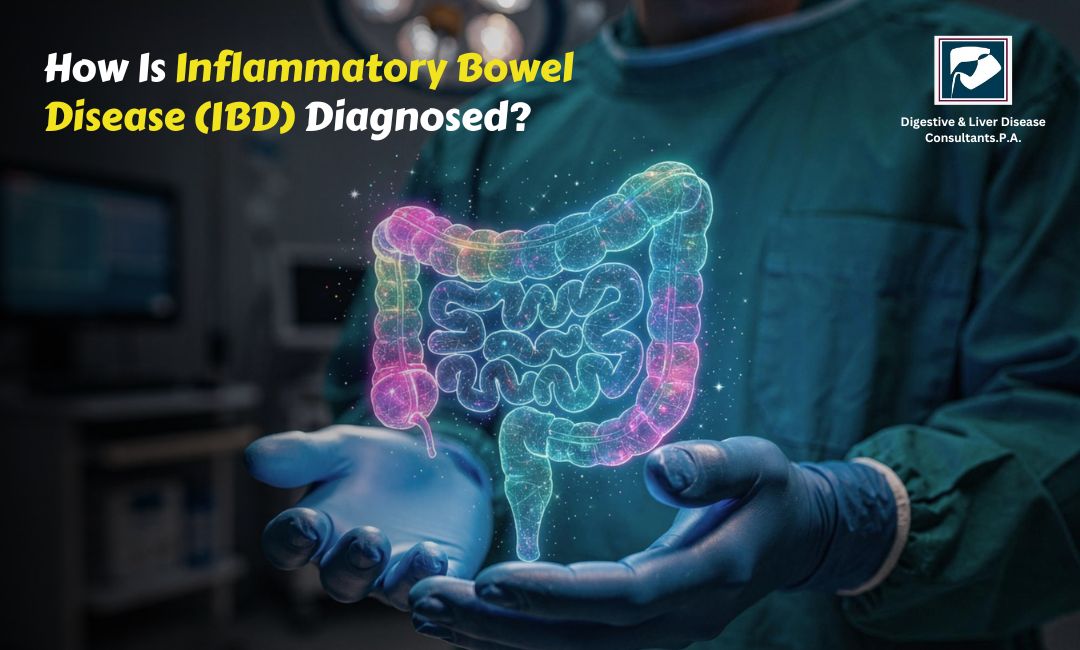Your liver is one of the hardest-working organs in your body. It helps filter toxins, supports digestion, stores nutrients, and regulates blood sugar levels. But what happens when your diet is filled with too much sugar? Over time, excess sugar can damage your liver, even if you don’t drink alcohol. That’s why adopting a low-sugar diet is one of the best steps you can take to protect your liver health.
In this blog, we'll explore how sugar affects the liver and how cutting back on it can help improve liver function. At Digestive & Liver Disease Consultants, P.A., we’re here to help you make smarter choices for a healthier liver and a better life.
The Liver’s Role in Processing Sugar
When you eat sugar, your body breaks it down into glucose (a form of energy) and fructose. Glucose is used by your cells for energy. Fructose, however, is handled mainly by the liver. If you consume too much sugar, especially in the form of high-fructose corn syrup or sugary drinks, your liver gets overwhelmed. Over time, this can lead to fat buildup in liver cells.
This condition is called non-alcoholic fatty liver disease (NAFLD), which affects millions of people worldwide. If left untreated, NAFLD can progress to inflammation, liver damage, scarring (cirrhosis), and even liver failure.

What Is a Low-Sugar Diet?
A low-sugar diet means reducing the amount of added sugars you consume while still getting natural sugars from healthy foods like fruits, vegetables, and whole grains. Added sugars are found in foods such as:
- Sodas and sweetened beverages
- Desserts like cakes, cookies, and ice cream
- Candy and chocolate
- Sweetened cereals and snack bars
- Sauces, dressings, and flavored yogurts
Reading food labels is essential. Ingredients like corn syrup, cane sugar, sucrose, and dextrose all count as added sugars. The American Heart Association recommends no more than 25 grams (6 teaspoons) of added sugar per day for women and 36 grams (9 teaspoons) for men.
How Too Much Sugar Harms the Liver
Let’s take a closer look at the ways sugar affects your liver health:
1. Fat Buildup in the Liver
When your liver breaks down fructose, it turns any extra into fat. If this happens too often, fat starts to accumulate in liver cells. Over time, this can lead to NAFLD, which often has no symptoms in its early stages.
2. Increased Insulin Resistance
A high-sugar diet can cause your body to become less sensitive to insulin, a hormone that helps control blood sugar levels. Insulin resistance forces your liver to work harder, increasing fat storage and inflammation.
3. Liver Inflammation and Scarring
Fatty liver disease can progress to a condition called non-alcoholic steatohepatitis (NASH)—a more serious form of liver disease involving inflammation and liver cell damage. If left untreated, it can lead to liver fibrosis (scarring), cirrhosis, and even liver cancer.
Benefits of a Low-Sugar Diet for Your Liver
The good news is that the liver has an amazing ability to heal, especially in the early stages of liver disease. By reducing your sugar intake, you can:
Reduce Fat in the Liver
A low-sugar diet helps your liver clear out excess fat, reducing the risk of NAFLD or slowing its progression.
Improve Insulin Sensitivity
Lower sugar intake helps regulate blood sugar levels and improve your body’s response to insulin, which eases the workload on your liver.
Decrease Inflammation
Cutting back on sugar reduces inflammation in your liver and throughout your body, lowering your risk of chronic disease.
Boost Energy and Overall Health
Reducing sugar often leads to better digestion, fewer energy crashes, weight loss, and better heart health—all of which benefit your liver.
Easy Tips to Lower Sugar in Your Diet
You don’t have to give up all sweets to protect your liver. Making small, consistent changes can lead to big improvements in your liver health. Here are some easy tips:
- Choose water or unsweetened drinks instead of soda or sweetened tea.
- Eat whole fruits instead of fruit juices or flavored snacks.
- Pick plain yogurt and add your own fruit instead of buying flavored versions.
- Read food labels and aim for products with little or no added sugars.
- Cook more at home so you can control the ingredients in your meals.
- Use spices like cinnamon or vanilla to add flavor without sugar.
Nutrition and Liver Health: What to Eat
While cutting sugar is important, adding the right foods can further support your liver. Focus on a diet that includes:
High-fiber foods: Whole grains, vegetables, legumes, and fruits
Healthy fats: Avocados, nuts, seeds, and olive oil
Lean protein: Fish, chicken, tofu, or legumes
Antioxidant-rich foods: Berries, leafy greens, and cruciferous vegetables (like broccoli and Brussels sprouts)
These foods not only reduce liver fat but also help detoxify and reduce inflammation.
About Digestive & Liver Disease Consultants, P.A.
At Digestive & Liver Disease Consultants, P.A., we specialize in diagnosing and treating a wide range of liver and digestive disorders. Our expert team is committed to helping you live a healthier life through personalized care and state-of-the-art treatments.
We focus on liver health every day—not just during appointments. We guide patients through diet changes, lifestyle improvements, and medical treatments to prevent and manage conditions like NAFLD, hepatitis, and liver cirrhosis. If you're struggling with fatigue, abdominal discomfort, or abnormal liver tests, we’re here to help.
Conclusion
Your liver is a vital organ that deserves your care and attention. One of the best ways to support your liver function is by reducing your sugar intake. A low-sugar diet can help prevent fatty liver disease, improve insulin sensitivity, reduce inflammation, and promote overall wellness.
If you are experiencing signs of liver trouble—like fatigue, bloating, or abnormal blood test results—don’t wait. Contact Digestive & Liver Disease Consultants, P.A.






